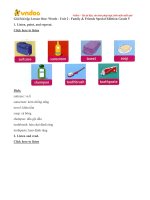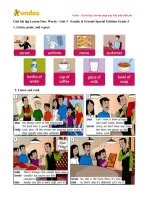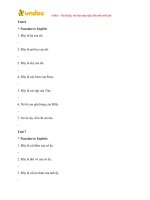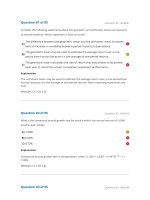Risk Epistemologies and Aesthetic Reflexivity of a Disaster-Affected Community: Findings from Vietnam
Bạn đang xem bản rút gọn của tài liệu. Xem và tải ngay bản đầy đủ của tài liệu tại đây (71.98 KB, 4 trang )
1133120
SRO0010.1177/13607804221133120Sociological Research OnlineNguyen-Trung
research-article2022
Article
Risk Epistemologies and
Aesthetic Reflexivity of a
Disaster-Affected Community:
Findings from Vietnam
Sociological Research Online
1–15
© The Author(s) 2022
Article reuse guidelines:
sagepub.com/journals-permissions
/>DOI: 10.1177/13607804221133120
journals.sagepub.com/home/sro
Kien Nguyen-Trung
Monash University, Australia
Abstract
Scholars and policymakers often use their expert knowledge to define the risk that laypeople
face. Nonetheless, they have frequently overlooked how laypeople describe and explain the risks
they face on a daily basis. Moreover, an emphasis on individualisation and reflexivity in Western
societies has led to little understanding of how a non-Western community constructs its shared
risk culture and how this culture associates aesthetic reflexivity and risk epistemologies. The
purpose of this research is to fill these gaps by exploring how Vietnamese farmers reflexively
define risk in their everyday lives, which in turn informs their risk-taking attitude and action.
Drawing on a case study of disaster-prone farmers in the Vietnamese Mekong Delta, this research
reveals a distinct set of farmers’ risk epistemologies through a process of hermeneutic reflexivity
situated in their risk culture and a shared identity. They do not view risk as wholly negative but
rather as an opportunity to attain the aim of surviving and profiting. They see cultivating a risky
crop as a collective action of risking their lives, sharing with their community both the challenges
and the opportunities that risk might offer. My article makes a case for sociological research into
non-Western civilizations, where late modernity and reflexivity might not be accompanied by
individualisation but rather with collectivism and tradition.
Keywords
aesthetic reflexivity, disaster, farmers, laypeople, risk epistemologies, risk perception, Vietnam
Introduction
Beck (1992) contends that Western civilizations have evolved into a risk society as a
result of increasing technical failures (e.g. the Chernobyl accident). He asserts that the
first modernity has given way to a late modernity in which societies must contend with
Corresponding author:
Kien Nguyen-Trung, BehaviourWorks Australia, Monash Sustainable Development Institute, Monash
University, Menzies Building, 20 Chancellors Walk, Clayton, VIC 3800, Australia.
Email:
13
Nguyen-Trung
hand, this finding shows that Vietnamese farmers’ reflexive capacity is comparable to
that of farmers living in Chernobyl-affected areas (Wynne, 1992). On the other hand, it
implies the significance of traditions and culture in constructing Vietnamese farmers’
biographies and risk dispositions. This paper argues that sociological research on nonWestern civilizations should take into account the context-sensitive forms of reflexivity
and risk epistemologies, which might not have been previously articulated in the West.
In sum, I have examined and presented various themes in Vietnamese farmers’ risk
knowledge in this research. Farmers conceptualised risk in four interrelated ways. First,
farmers defined risk in terms of their livelihood as rice growers. Rice farming is a core
value ingrained in their risk culture, which shapes how farmers define and recognise
risks. Second, farmers viewed risk as an inability to cope with the unpredictability of
climatic change and environmental threats as well as the strength of divine force. Thus,
some farmers accepted risk as something created by God or were at the mercy of other
supernatural forces. Third, risk is a blend of positive and negative aspects, as well as
reward and punishment. Farmers usually emphasised the opportunities presented by risk
rather than the challenges they would encounter. Fourth, farmers defined risk as a collective action of putting their lives at risk. They exhibited a risk-taking mentality, believing
that it was an integral part of being a rice farmer. Farmers portrayed themselves in this
decision-making process as a communal identity rather than as a single individual identity since they could share both the benefits and the consequences of taking risks together.
Acknowledgements
The author wants to thank his wife and two daughters for their love, support, and understanding.
Heartfelt thanks to Associate Professor Helen Forbes-Mewett and Professor Dharmalingam
Arunachalam (Monash University) for their tremendous support.
Funding
The author(s) disclosed receipt of the following financial support for the research, authorship, and/
or publication of this article: This work was supported by the Monash Postgraduate Publication
Award (2021). The author would like to thank Monash University for funding this research.
ORCID iD
Kien Nguyen-Trung
/>
References
Adkins L (2003) Reflexivity: Freedom or habit of gender? Theory, Culture & Society 20(6): 21–42.
Beck U (1992) Risk Society: Towards a New Modernity. Thousand Oaks, CA: SAGE.
Beck U (2006) Living in the world risk society: A hobhouse memorial public lecture given on
Wednesday 15 February 2006 at the London School of Economics. Economy and Society
35(3): 329–345.
Bourdieu P (1977) Outline of a Theory of Practice. Cambridge: Cambridge University Press.
Bourdieu P (1984) Distinction: A Social Critique of the Judgement of Taste. Cambridge, MA:
Harvard University Press.
Bourdieu P (1990) The Logic of Practice. Stanford, CA: Stanford University Press.
Braun V and Clarke V (2006) Using thematic analysis in psychology. Qualitative Research in
Psychology 3(2): 77–101.
14
Sociological Research Online 00(0)
Braun V and Clarke V (2016) (Mis)conceptualising themes, thematic analysis, and other problems
with Fugard and Potts’(2015) sample-size tool for thematic analysis. International Journal of
Social Research Methodology 19(6): 739–743.
Braun V and Clarke V (2019) Reflecting on reflexive thematic analysis. Qualitative Research in
Sport, Exercise and Health 11(4): 589–597.
Bui QD and Nguyen-Trung K (2017) Mấy vấn đề đất nông nghiệp qua cuộc khảo sát tại 2 xã Tân
Long, tỉnh Hậu Giang và xã Thân Cửu Nghĩa, tỉnh Tiền Giang. Tạp Chí Xã Hội Học 1(137):
11–23.
Bunn M (2016) Habitus and disposition in high-risk mountain-climbing. Body & Society 22(1):
92–114.
Bunn M (2017) A disposition of risk: Climbing practice, reflexive modernity and the habitus.
Journal of Sociology 53(1): 3–17.
Burton RJ (2004) Seeing through the ‘good farmer’s’ eyes: Towards developing an understanding
of the social symbolic value of ‘productivist’ behaviour. Sociologia Ruralis 44(2): 195–215.
Burton RJ, Kuczera C and Schwarz G (2008) Exploring farmers’ cultural resistance to voluntary
agri-environmental schemes. Sociologia Ruralis 48(1): 16–37.
Castells M (1997) The Information Age: Economy, Society and Culture. Volume I: The Rise of the
Network Society. Oxford: Blackwell Publishers.
Conway SF, McDonagh J, Farrell M, et al. (2021) Going against the grain: Unravelling the habitus of older farmers to help facilitate generational renewal in agriculture. Sociologia Ruralis
61(3): 602–622.
Creswell JW (2007) Qualitative Inquiry and Research Design: Choosing among Five Approaches.
Thousand Oaks, CA: SAGE.
Dean M (1999) Governmentality: Power and Rule in Modern Society. Thousand Oaks, CA: SAGE.
Douglas M (1992) Risk and Blame. London: Routledge.
FAO (2016) ‘El Nino’ event in Vietnam: Agriculture, food security and livelihood needs assessment in response to drought and salt water intrusion. Available at: />i6020e/i6020e.pdf
Forbes-Mewett H and Nguyen-Trung K (2019) Defining vulnerability. In: Forbes-Mewett H (ed.)
Vulnerability in a Mobile World. Bingley: Emerald Publishing Limited, pp. 5–27.
Forbes-Mewett H and Nguyen-Trung K (2022) Global markets, risk, and organized irresponsibility in regional Australia: Emergent cosmopolitan identities among local food producers in the
Liverpool Plains. Rural Sociology 87(3): 1111–1134.
Giddens A (1991) Modernity and Self-Identity: Self and Society in the Late Modern Age. Stanford,
CA: Stanford University Press.
Gillespie C (2012) The experience of risk as ‘measured vulnerability’: Health screening and lay
uses of numerical risk. Sociology of Health and Illness 34(2): 194–207.
Johnson BB (1993) Advancing understanding of knowledge’s role in lay risk perception. Risk
4(189): 3.
Kessler S (1989) Psychological aspects of genetic counseling: VI. A critical review of the literature dealing with education and reproduction. American Journal of Medical Genetics 34(3):
340–353.
Lash S (1993) Reflexive modernization: The aesthetic dimension. Theory, Culture & Society
10(1): 1–23.
Lash S (1994a) Expert-systems or situated interpretation? Culture and institutions in disorganized capitalism. In: Beck U, Giddens A and Lash S (eds) Reflexive Modernization: Politics,
Tradition and Aesthetics in the Modern Social Order. Stanford, CA: Stanford University
Press. pp.198–215.
Nguyen-Trung
15
Lash S (1994b) Reflexivity and its doubles: Structure, aesthetics, community. In: Beck U, Giddens
A and Lash S (eds) Reflexive Modernization: Politics, Tradition and Aesthetics in the Modern
Social Order. Stanford, CA: Stanford University Press, pp. 110–173.
Le Dang H, Li E, Nuberg I, et al. (2014) Farmers’ perceived risks of climate change and influencing factors: A study in the Mekong Delta, Vietnam. Environmental Management 54(2):
331–345.
Lupton D (1993) Risk as moral danger: The social and political functions of risk discourse in public health. International Journal of Health Services 23(3): 425–435.
Lupton D and Tulloch J (2002a) ‘Life would be pretty dull without risk’: Voluntary risk-taking and
its pleasures. Health, Risk & Society 4(2): 113–124.
Lupton D and Tulloch J (2002b) Risk is part of your life’: Risk epistemologies among a group of
Australians. Sociology 36(2): 317–334.
Lyng S (1990) Edgework: A social psychological analysis of voluntary risk taking. American
Journal of Sociology 95(4): 851–886.
Lyng S (2005) Edgework and the Risk-Taking Experience. New York: Routledge.
Mythen G (2004) Ulrich Beck: A Critical Introduction to the Risk Society. London: Pluto Press.
Nguyen-Trung K (2019) Vulnerability to natural disasters: The case of Vietnam’s Mekong Delta.
In: Forbes-Mewett H (ed.) Vulnerability in a Mobile World. Bingley: Emerald Publishing
Limited, pp. 71–90.
Nguyen-Trung K (2021) Understanding Disaster Vulnerability in the Vietnamese Mekong Delta.
Melbourne, VIC, Australia: Monash University.
Nguyen-Trung K, Forbes-Mewett H and Arunachalam D (2020) Social support from bonding and
bridging relationships in disaster recovery: Findings from a slow-onset disaster. International
Journal of Disaster Risk Reduction 46: 101501.
Patton MQ (2002) Qualitative Research and Evaluation Methods. Thousand Oaks, CA: SAGE.
Stake RE (1995) The Art of Case Study Research. Thousand Oaks, CA: SAGE.
Stake RE (2005) Qualitative case studies. In: Denzin NK and Lincoln YS (eds) The Sage Handbook
of Qualitative Research. Thousand Oaks, CA: SAGE, pp. 443–466.
Tulloch J and Lupton D (2003) Risk and Everyday Life. Thousand Oaks, CA: SAGE.
Walby K and Doyle A (2009) ‘Their risks are my risks’: On shared risk epistemologies, including
altruistic fear for companion animals. Sociological Research Online 14(4): 8–18.
Wynne B (1992) Misunderstood misunderstanding: Social identities and public uptake of science.
Public Understanding of Science 1(3): 281–304.
Yin RK (1981) The case study as a serious research strategy. Knowledge 3(1): 97–114.
Yin RK (2014) Case Study Research: Design and Methods. Thousand Oaks, CA: SAGE.
Zinn JO (2008) Risk society and reflexive modernization. In: Zinn JO (ed.) Social Theories of Risk
and Uncertainty: An Introduction. Oxford: Blackwell Publishing, pp. 18–51.
Author biography
Kien Nguyen-Trung is a research fellow at BehaviourWorks Australia, Monash Sustainable
Development Institute. He is a member of The Qualitative Report’s editorial board and the founder
of the Vietnamese Social Research Methodology. His current work aims at facilitating sustainable
behaviour and social change in climate change adaptation and disaster risk management. His
recent publications focus on the social construction of disaster vulnerability, the role of social capital in disaster recovery, and the organised irresponsibility and environmental movement in regional
Australia.
Date submitted 3 April 2021
Date accepted 16 September 2022



